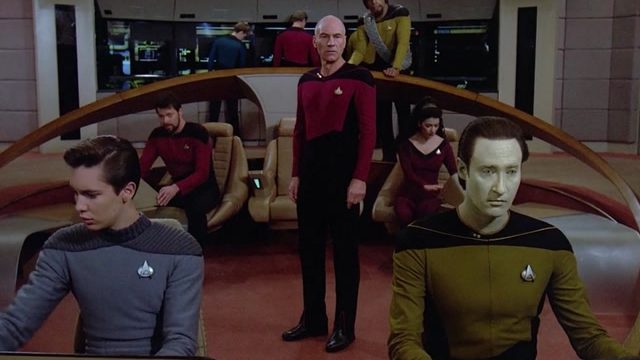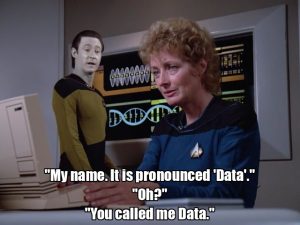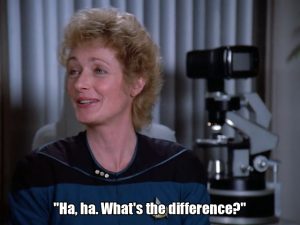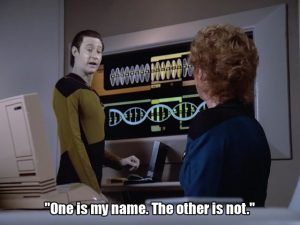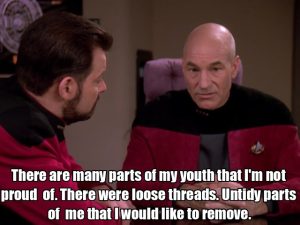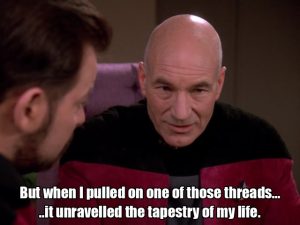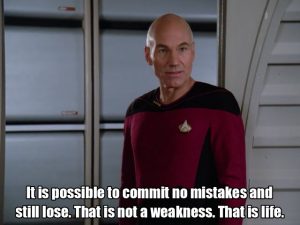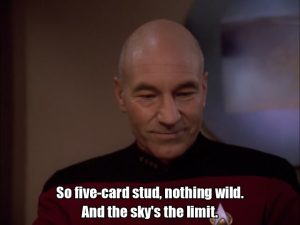Before diving into the show, I found the idea of writing an essay on Star Trek: The Next Generation to be an intimidating one. My priority as a critic is original truth – I have to have something novel to say on a topic and it has to be true. From that perspective, it would take a monumental level of arrogance to believe I would have something new to say about a show so influential – so widely discussed and interpreted – that it’s one of the few to inspire an entire subgenre in backlash to its ideas. Battlestar Galactica is probably the most famous of these (a rejection of TNG‘s optimism and conflict-free relationships), but you also have Blake’s Seven, Firefly, Farscape, and even Star Trek‘s own Deep Space Nine just to name a few. The backlash itself was so strong that it inspired its own backlash (mostly, I think, in critical and fannish discourse), and it’s only since that died down as well and the show has become a truly historical artifact that we’ve reached a stage where it’s getting reclaimed from history through descendants like The Orville and Lower Decks.
This is a show which has been iconicised, copied, parodied, deconstructed, reconstructed, rejected, reclaimed, rebuilt, discussed, and otherwise interpreted from every conceivable angle. I would actually argue it’s more influential than the original show – every single space opera with aliens has had their version of the Klingons (my favourite, of course, being the krogan of Mass Effect) and they took that honour-bound war-loving idea of them from TNG. The Western liberal politics of the show have been weighed, measured, and found wanting; the optimism is pathetically limited but also inspiring; the episodic disaster o’ the week structure is a product of an earlier time in television, before they had the sense to serialise everything. These are the ideas the collective have come to about The Next Generation. What could I possibly see in this show that millions before me hadn’t? What could I have to say that Abigail Nussbaum didn’t say better over a decade ago?
Then I put on the first episode, and friends, I cried. I felt like the prodigal son finally returning home to find it was where he was supposed to be all along. My family watched this religiously up until I was about five years old (which would be 1995 for clarification) before switching to Stargate: SG-1 as our scifi show of choice. I recall it being an obsession alongside Star Wars, with my small but well-loved collection of toys and posters – my mother enjoyed laminating decorations on my workbooks for school, and one year I got her to cover my books with TNG schematics from various books. One aspect of my pleasure on rewatching the series as an adult was finding almost everything I considered to be missing from TV shows over the years – that, secretly even to me, I had been comparing all these shows to TNG and finding them wanting. Dialogue that frequently chooses beauty and truth over realism. Short-term plotting that aims for resolution of what it can resolve and a willingness to embrace ambiguity for the rest. A willingness to allow individual episodes to have consequences later.
And to be clear, it ran deeper than simple aesthetic. I once said that I consider Mal Reynolds to be pretty close to my ideal self-image; TNG could be said to be my idealised consciousness. At its core, this is a show about Curiosity, and it’s practically a machine carefully polished, tuned, and refined to feeding and rewarding that. Of its various ideas, possibly the most toxic is that it presents meetings as productive places where things actually get accomplished; each and every character has a practical and philosophical perspective to contribute to any problem that comes up. Worf will analyse security risks and argue for the more violent and aggressive solutions to problems (and, when it comes up, Klingon cultural ideas within the problem). Sometimes he’ll be right, and sometimes he’ll be wrong. Troi lays out feelings of various people within the problem, and she’ll argue for protection of individual perspectives and rights. Sometimes she’ll be etc.
It’s a show where the plotting isn’t dramatic, it’s scientific. A mystery appears and we hypothesise an answer, test it out, see the results, and rinse and repeat until we hit the truth. The process of solving mysteries on this show is so refined and mechanical that I find myself genuinely compelled to keep watching; the most underrated quality of TNG is that every single mystery compels me as strongly as any dramatic work. I find myself comparing it to the mechanical and propulsive plotting of Law & Order: SVU, except rather than being driven by disgust, it’s driven by that curiosity. I admire L&O: SVU‘s mechanical nature because I admire any visionary that knows exactly what they want and have tuned everything around them to getting it, but I’m repulsed by the way it uses that system to make the universe smaller. TNG uses its equally functional – arguably, more complex – system to make the universe bigger.
This is connected to its sense of play. Two of the most hacky common jokes about the series (even when it’s not specifically namedropped) are about its technobabble – either something like “the tachyons are in the neutron field!” or lines swapping out words in simple idioms like “a Klingon ba’tel in a china shop”. I agree that the plot turns can come off as absurd (one could make a drinking game out of a character dropping the most inane babble you’ve ever heard at an enemy and another character responding “Nicely done.”) and the dialogue in that vein often limping, but it’s a natural outlet of TNG committing to invention, even when not necessary. It obviously needs to make shit up for a sense of mystery and discovery – it doesn’t matter how much you know about physics or history or Sherlock Holmes, you’ll be exactly as at sea as everyone else – but the fact that they drown the entire show in this sense of discovery makes it a fundamental part of the TNG experience.
(One can see this in the romance o’ the week episodes. In any other show, they suck because they’re perfunctory devices. Here, each individual is given the same amount of interest as Klingon culture, and they reveal things about our main characters)
The characters follow suit. I’m always fascinated by the relationship between character and storyteller, and in this case, the characters are happy to soak up everything the writers throw at them and more. One part of this show’s warm heart is how the characters have an incredibly diverse set of interests that seems to pile up over the seven seasons. They stage plays, practice music, paint, learn martial arts (Klingon, of course), and many other hobbies; one of my real turning points in understanding the show was when it finally clicked that, if this supposed to be a post-scarcity society, the characters were doing their jobs because they genuinely wanted to, as opposed to someone like me who works specifically to fuel the things I actually care about, and this means that they can approach these hobbies with a sense of play I have generally failed to bring. Having to work was bad enough, but I was doing it to myself!
Identification is an interesting thing. In contemporary discourse, people mean that a character is reflecting their thoughts, feelings, and experiences back at them. This character expresses how I would feel and does what I would do, so I identify with them. In his seminal series on The Shield, beloved Soluter wallflower used it to mean understanding the character’s choices regardless of their identity; I am not a straight black woman, but I can see what options Claudette has open to her and I know what she wants, so I identify with her and feel her catharsis. When I was a kid, I was most attached to Data – I recall playing with my Data and Geordi toys the most – so I assumed when watching the show as an adult that it was because I identified with him and that I would identify with him again. Instead I was disturbed to see an echo of someone I used to be.
Data is interesting because the writers genuinely commit to him being a character with values but not emotions. Yet another way other stories have failed me is how their robot characters inevitably fall to sentimentality or emotion in some way; the most absurd expression of this is in my otherwise beloved Mass Effect 2, in which a robot inexplicably and with no lore-based justification falls in love with the main character. On TNG, not only does Data openly and often state he has no emotions, he backs this up by never seeking revenge, never feeling shame, never falling into neuroticism. He is a purely goal- and value-oriented person, methodically following steps to solve whatever problem he has chosen to dive into. My favourite example of this is a season seven episode in which he has lost his memory and accidentally exposed an alien village to radioactive material, and nothing – not the lack of technology, not the increasing anger of the locals, not the discovery that it was indeed his fault – slows down his investigation, and he ends the episode with no more malice towards anyone than he started with.
There was a point a very long time ago where I could recognise myself in that – where I wasn’t carrying so much anger at the world and the people in it, and I didn’t beat myself up for my failures so badly. I don’t just identify with Data, I was him at one point. It makes me sad to think how much of my life I’ve spent not being him. One thing that moves me is that Data constantly points out that his artistic works are technically proficient but lack soul or originality; this is never enough to stop him continuing his work. I can see how my works are the reverse – crude but soulful. Either way, he would likely agree that individual works are simply one step in the lifelong process of finding humanity.
Ron Moore is an interesting figure in Star Trek history. He’s a classic example of talent rising to the top through a mixture of dumb luck and hustle – managing to spin a tour of the TNG set into role as producer, and then onto creating the flagship of the backlash against Trek. But right from the start, he was managing to expand the possibilities of TNG by wildly diverging from the point of it. His episodes aren’t the essays of the rest of the series – rather, they’re character studies. That is to say, they aren’t individual questions with each character suggesting answers before building to a final conclusion; they’re analysis of one individual and demonstrations of their character. He’s the John Swartzwelder of TNG – a voice so distinct and so visionary that it stands out even in the flattening nature of a television writer’s room. As someone so instinctively tuned to a Standard Episode Of TNG, I find it extraordinarily frustrating, of course, and all the moreso because nobody understands or writes Picard better.
One of the interesting things about TNG is that, for a show about Great People, it was at its best when the characters were a little bit weak. Not fragile – Barclay episodes were unbearable to me – but not completely superhuman either. One thing I found interesting about Geordi (which I don’t think the show ever fully picked up on) is that he’s the most temperamentally conservative character on the ship – all the way up to the final episode, he’s the most likely to dismiss any theory out of hand and the most nervous about change; I got the sense that he liked hanging out with Data because our friendly neighbourhood android would innocently and happily take in any bold declaration of How Things Are that Geordi cares to give. Troi strikes me as someone who is fully about social responsibility right up until her sense of right and wrong is challenged; I loved her episodes because they were almost always about her righteousness being set off, especially when it came to her mother. Data and Worf’s struggles with their various weaknesses have been well documented over the years (and indeed deconstructed – I feel Wrex of Mass Effect is the last word on a Worf-like character).
(Crusher is the most thinly-written of the characters – she generally worked best for me as either a foil for Picard or mother to Wesley, which the writers didn’t generally go for in her episodes. Riker is the best example of an idealised character with no real flaws to play with – I love how warmly he regards his crewmates.)
But it’s Picard who manages to rise above attempts to define him – who has truly resisted being pinned down by all those responses to him. Like all the best and most interesting people, his strengths and weaknesses are exactly the same thing – he’s decisive and stodgy, he’s a curious mystic and a self-righteous ass, he has a deep respect for the rights of individuals and a tendency to distance himself from others. ‘Backstory is bullshit’ is an idea I’ve been grappling with for years, and TNG makes it work by presenting Picard as the climax of a series of decisions that he would obviously make. Every time we dive into Picard’s backstory, we see another decision he made and the road he chose not to travel. One of the fascinating things about the show from about “The Inner Light” onward is that it increasingly presents skepticism of Starfleet.
For Picard, Starfleet comes to represent freedom, exploration, and constant progression. He’s constantly sharing artifacts he’s picked up over a long career with gleeful enthusiasm, geeking out over their historical meaning. But he also comes to see the things he chose to give up; mostly it’s family, not just in the sense that he never had a wife or children (this being made in the Nineties, heteronormativity being a thing despite their best efforts) but in that he destroyed his relationship with his father to pursue his dreams in Starfleet. But in a way, he also gave up his freedom when he joined Starfleet. He has responsibilities to a larger system and so has to put his personal morality aside all the time for its sake, and he can’t really just go traipsing around the galaxy at will. There are too many Romulans and Cardassians and Klingons – too complex a political situation that he has chosen a position in.
But the thing is, the writers (and especially Ron Moore) understand that a meaningful decision is between two positive but incompatible options. It’s not between a stupid thing and the obviously correct thing – you have to get something out of either path. It’s incredible to come to this after three decades of being told that TNG is this impossible naively optimistic fantasy; this melancholic resignation that you’re doing exactly what you love. Picard’s personal episodes are as much him accepting his decisions as it is him explaining them, and much of his journey form the start to the end is allowing himself to change a lot of his smaller decisions – letting himself have little families and little moments.
Star Trek: The Next Generation ends exactly as perfectly as The Shield. It is, of course, a thrilling essay-like adventure, driven by understanding why Q threw Picard at the anomaly that’s bouncing him around through time; as always, I was burning with intellectual curiosity as to what the solution could be and delighted with the final time-warping result. But it’s also a perfect love letter to the show and the characters we grew to love over seven seasons, which it achieves, of course, by weaving our love for them into the plot. Picard knows who they are and how they work and he has to roll with that to solve the puzzle o’ the week. To my shock, it also provided closure on my own emotional journey through the show; the things Q was asking of Picard felt directed right at me. Had I grown as a person since and because of watching this show?
The answer, of course, is yes. The show inspired me to reach back in my memories and find a spirit and drive I had forgotten about; to organise my thoughts more efficiently for what I want; to explore strange new ideas and new hobbies; to boldly go where a six year old would have happily gone before. I feel content and anxiety-free in a way that I haven’t felt in a lifetime. The hilarious thing is that after all that TNG backlash and counter-backlash as well as everything I’ve ever said on the subject, I find this show the best argument for optimism. Not in the sense that everything will always work out perfectly, because the show doesn’t believe in that anyway. Not in the sense that people are inherently good and will reveal that goodness, because the show always knew it was a fantasy in that sense; it knows people aren’t actually like this and it’s asking ‘what if they were?’.
Rather, in the sense that the process of being alive itself is an inherently pleasurable one. To be surprised by what we find, to systematically process these things, to flagrantly make things up and fling them out into the universe and be surprised again by what they cause. The show does not discriminate between what’s worth processing and what isn’t; its aims are as high as the organising of society and as low as figuring out how a joke works; its emotions are as joyful as understanding romantic love and as painful as understanding a loved one’s slide into dementia. Some things take a scene to understand, some take an episode, some were still not fully understood after seven seasons. It’s worth looking at the world and trying to figure out what works about it, even when – no, especially when it seems offensive at first glance.

